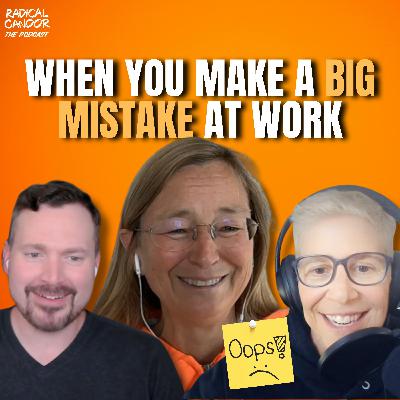We’ve all been there—that heart-sinking moment when you realize you’ve messed up at work. Kim, Jason, and Amy discuss how to recover from a big mistake without letting self-blame take over. Inspired by a Reddit post about a project that fell months behind, they share lessons from their own experiences, practical ways to take responsibility, and how to follow through with a recovery plan that actually works. You’ll learn why asking for support is a strength, not a weakness, and how managers can identify trouble early, check in effectively, and foster a culture where it’s safe to speak up before problems escalate. Whether you’ve missed a deadline, dropped the ball, or just want to be ready if things go sideways, this episode will help you rebuild trust and turn a setback into an opportunity for growth.
Get all of the show notes at RadicalCandor.com/podcast.
Episode Links:
Transcript
Barings Bank: Its Collapse, Acquisition, and Lessons Learned | Investopedia
I Fell Behind At Work And Fucked Up: How Do I Move Forward? | Reddit
Resources For Feedback Training, Coaching & Development | Radical Candor
How Delivering Bad News Early Strengthens Your Relationships at Work | Radical Candor
Why Procrastinators Procrastinate | Wait But Why
6 Steps for Setting Measurable Goals to Avoid "Productivity Paranoia" | Radical Candor
The Bob Story, a Tale of Ruinous Empathy | Radical Candor Podcast 4 | 1
Connect:
Website
Instagram
TikTok
LinkedIn
YouTube
Bluesky
Chapters:
(00:00:00) Introduction
Kim, Jason, and Amy introduce a Redditor’s dilemma about falling months behind on a project.
(00:02:59) When Big Mistakes Happen
Stories of mistakes and why they feel so personal.
(00:04:05) From Lost to Regained Credibility
Why credibility is already damaged—and how to earn it back.
(00:06:20) Getting Away With Mistakes
How getting away with a risky choice makes it tempting to repeat.
(00:08:32) Procrastination or Denial?
Recognizing the difference and the risk to your reputation.
(00:12:31) Acknowledging the Mistake
Why the first step to regaining credibility is admitting the error.
(00:15:34) Kim’s Story of Denial
A personal startup experience, health struggles, and hard truths.
(00:20:29) Accountability Without Punishment
Why admitting mistakes doesn’t mean beating yourself up.
(00:21:40) The Manager’s Role
How leaders can spot issues early and make bad news safe to share.
(00:26:34) Escaping the “Death March”
Breaking the cycle of repeated missed deadlines.
(00:29:45) Preventing Crisis With Goal Tracking
How visibility helps identify delays before they become disasters.
(00:33:09) A Plan to Rebuild Trust
Steps for repairing credibility with your boss and peers.
(00:36:11) Cognitive vs. Affective Trust
The two sides of workplace trust and how to restore them.
(00:38:04) Radical Candor Tips
Advice for self-forgiveness, peer support, and managing accountability.
(00:41:37) Conclusion
Learn more about your ad choices. Visit megaphone.fm/adchoices



























radical candor for russ @6.50mins
I am trying to better myself and become a leader worth having. Thank you for doing these podcasts.
will there ever be more episodes?
awesome podcast for any leader!!
Meh. Kim's voice is grating. (Not that she can do anything about it.) I am also bewildered that she shared the time she passive aggressively wrote a novel on the job for A MONTH. Both hosts also talk extensively about their time at Google. Disappointed.